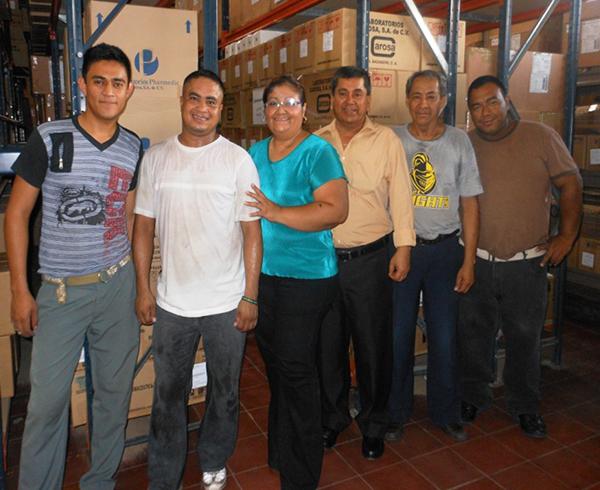Where We Work
See our interactive map


En Español
This post originally appeared on the CapacityPlus blog.
El Salvador’s Ministry of Health has 111 warehouses nationwide, and only two are directed by women. Yesenia Aguirre de Barahona is one of those two women, working as a warehouse guard in the Paracentral Region. Her warehouse supplies medicines to 73 health centers that serve a total of 882,243 people.
After graduating with a bachelor’s degree in marketing, she gained 23 years of experience working in the supply chain of the country’s health system, and spent seven years as a guard of medication warehouses. Even though she is highly experienced, she faces some challenges due to being a woman in a role typically held by men. “I have in my charge seven men,” Yesenia explains, “and sometimes it is difficult, because they say that a woman cannot give them orders, that this is not a position for women. It is a cultural issue, because our society is patriarchal.” Yesenia has succeeded in raising awareness, though: “I say ‘It’s not for me, it’s for the patients. Treat the medications with love.’ I have made their work important, and we are a team—with that I have achieved their respect.”
Now, Yesenia says, “there are employees of other warehouses that want to come to work with me because of the work environment, they say—because I cooperate with them. I also lift boxes and I treat everyone equally.”
Under the supervision of the procurement director, Mario Carbajal of the central Ministry of Health, Yesenia works every day to ensure that the medicines arrive at the health centers in a timely manner. “I know that my work helps to ensure the health of the population,” she says, “and that by having the health centers stocked and ensuring good storage practices, the poorest people have access to health.”
Yesenia Aguirre de Barahona was one of the key informants in a situational assessment of human resources capacity for supply chain management, conducted by the Ministry of Health with CapacityPlus technical assistance. In August, I visited El Salvador to contribute to this assessment and train the local team, which collected information in five health regions and nine hospitals. The team also conducted seven focus group discussions and interviews with key actors from the University of San Salvador, the National Medication Direction, Acquisitions Unit, and Institutional Contracting. This work is part of the IntraHealth-led CapacityPlus’s efforts to professionalize the supply chain workforce and ensure access to HIV/AIDS commodities, with support from USAID’s Latin America and Caribbean Bureau. For her part, Yesenia thinks the assessment will be helpful. “My expectations are that it may contribute to some extent to provide us what we need, such as better staffing, training, to identify the weaknesses in the supply chain—and of course that these weaknesses can be strengthened.”
Venciendo las barreras de género: Yo soy una trabajadora de la salud de la cadena de suministroEl Ministerio de Salud de El Salvador tiene a nivel nacional 111 almacenes y solo 2, son dirigidos por mujeres. Yesenia Aguirre de Barahona es una de esas dos mujeres, se desempeña como guardalmacén de la Región Paracentral. El almacén abastece 73 centros de salud para una población beneficiaria de 882,243 personas.
Graduada como Licenciada en Mercadotecnia, tiene 23 años trabajando en la cadena de suministros en el sistema de salud salvadoreño, y siete como guardalmacén de medicamentos. A pesar de que tiene una gran experiencia, se enfrenta a algunos desafíos debido a ser mujer en un papel por lo general ocupado por los hombres.
“Tengo a mi cargo siete hombres,” explica Yesenia, “y a veces cuesta, porque ellos dicen que una mujer no puede darle órdenes, que este no es un cargo para mujeres. Es un tema cultural, pues nuestra sociedad es patriarcal.” Sin embargo, Yesenia los ha concientizado. “Les digo, ‘No es por mí, es por los pacientes, traten los medicamentos con amor.’ Les he importantizado su trabajo, y somos un equipo—con eso he logrado que me respeten.”
Ahora, dice Yesenia, “Resulta que hay empleados de otros almacenes que quieren venir a trabajar conmigo, por el ambiente de trabajo, dicen—porque colaboro con ellos, también cargo cajas y los trato a todos por igual.”
Bajo la dirección del Director de Abastecimientos Ing. Mario Carbajal del nivel central del Ministerio de Salud, Yesenia trabaja día a día para garantizar que el medicamento llegue oportunamente a los centros de salud. “Sé que mi trabajo contribuye a garantizar la salud de la población,” dice ella, “y al tener abastecidos los centros de salud y velar por las buenas prácticas de almacenamiento, la gente más pobre tiene acceso a la salud.”La Lic. Yesenia Aguirre de Barahona, formó parte de los informantes claves para un diagnóstico de situación de la capacidad de los recursos humanos en la gestión de la cadena de suministros realizado por el Ministerio de Salud con la asistencia técnica del proyecto CapacityPlus. En agosto, visité El Salvador para contribuir a este diagnóstico y a la capacitación del equipo local, que recogió información en cinco regiones de salud y nueve hospitales. El equipo también llevó a cabo siete grupos focales de discusión y entrevistas con principales actores de la Universidad San Salvador, la Dirección Nacional de Medicamentos, la Unidad de Adquisiciones, y Contrataciones Institucional. Este trabajo hace parte de los esfuerzos de CapacityPlus para profesionalizar la fuerza de trabajo de la cadena de suministro y garantizar el acceso a los productos básicos sobre el VIH/SIDA, con el apoyo de la oficina de USAID en Latinoamérica y el Caribe.
Por su parte, Yesenia opina que el diagnóstico será útil. “Mis expectativas son, que pueda contribuir en alguna medida a que nos proporcionen lo que necesitamos como mejor dotación, capacitación, a identificar las debilidades de la cadena de suministros y por supuesto que estas debilidades puedan ser fortalecidas.”
Get the latest updates from the blog and eNews




